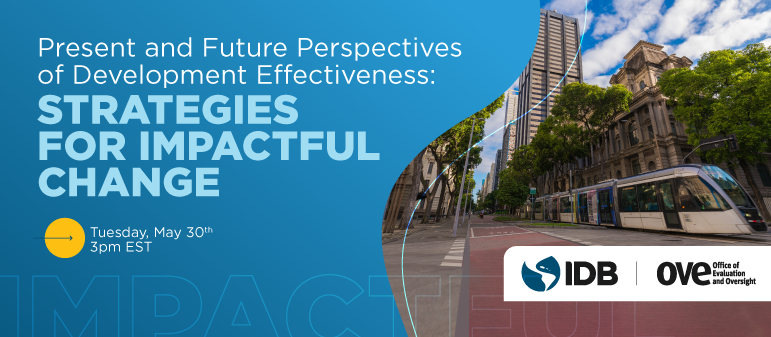Present and Future Perspectives of Development Effectiveness: Strategies for Impactful Change
Webinar | Online
About the Event

Development effectiveness refers to development interventions achieving their objectives. This term gained relevance in the international community during the 2000s, particularly after adopting the Paris Declaration on Aid Effectiveness in 2005, which established five best practice principles for effectively managing development resources. These principles have been reviewed in subsequent international meetings, with the most recent update made through the Busan Partnership Agreement in 2011. While those principles have proved to remain relevant, a revision can bring value to better align them to the complex global and local realities, and ultimately, to increase the capacity to demonstrate development results, one of the major challenges.
By bringing together evaluators from different development institutions, this panel intends to provide a forum for sharing knowledge and experiences about the evolution of development effectiveness and future perspectives through a discussion around a group of questions:
• Present and Future of Development Effectiveness: Do we all have the same understanding of development effectiveness? What has been achieved and which challenges remain? Which could be potential ways to address those challenges? How do we get there? Which innovative approaches can take us there?
By bringing together evaluators from different development institutions, this panel intends to provide a forum for sharing knowledge and experiences about the evolution of development effectiveness and future perspectives through a discussion around a group of questions:
• Present and Future of Development Effectiveness: Do we all have the same understanding of development effectiveness? What has been achieved and which challenges remain? Which could be potential ways to address those challenges? How do we get there? Which innovative approaches can take us there?
Speakers
| Name | Title | Biography |
|---|---|---|
| Rachael Calleja | Research Associate, Center for Global Development (CGD) | Rachael Calleja is a Research Fellow in CGD’s UK and European Development Leadership programme. Prior to joining CGD, she gained several years of experience conducting policy-relevant research and analysis through roles with the Overseas Development Institute and the Canadian International Development Platform. Rachael holds a PhD in International Affairs from Carleton University, Canada. Her research focuses primarily on issues of aid effectiveness, donor motivations, innovative aid modalities, and the strategy, management and organisation of bilateral development agencies. Rachael is also a Fellow at the Norman Paterson School of International Affairs, Carleton University. |
| Gabrielle Fattorelli | Director of the Corporate and Thematic Division of the Independent Evaluation Department, European Bank for Reconstruction and Development (EBRD) | Gabrielle Fattorelli is the Director of the Corporate and Thematic Division of the Independent Evaluation Department of the EBRD; leads and supports role in the planning, implementation, and supervision of the department’s vision, goals, strategies, and work plan, towards objectively assessing and enhancing the effectiveness of the EBRD. Responsible for a wide range of delegated strategic and line management responsibilities in close collaboration and consultation with EvD staff, EBRD Board, and Management. |
| Cesar Bouillon | Principal Economist, OVE - IDB | Principal Economist, OVE - IDB |
| Rasmus Heltberg | Lead Evaluation Specialist, Independent Evaluation Group (IEG), World Bank Group | Rasmus Heltberg is a Lead Evaluation Specialist at the Independent Evaluation Group (IEG) of the World Bank Group. He has led complex evaluations of the World Bank’s work on data for development, the WBG’s global convening power, the World Bank operating model, and the role of self-evaluation and M&E. He led the revamping of the annual Results and Performance Report. He also helped oversee external evaluations of the Climate Investment Funds and the Global Partnership for Education. He has previously worked on social protection, social development, adaptation to climate change, and disaster response, and was a member of the core team for the 2014 World Development Report on Risk and Opportunity. His research has been published in a variety of interdisciplinary development journals, including World Development, Journal of Development Studies, Environment and Development Economics, and Global Environmental Change. Rasmus holds a Ph.D. and M.Sc. in Development Economics from the University of Copenhagen and a M.Sc. in Quantitative Development Economics from the University of Warwick. |
Moderators
| Name | Title | Biography |
|---|---|---|
| Claudia Figueroa | Evaluation Specialist, OVE - IDB | Claudia Figueroa is an economist with 10+ years of experience in multilateral organizations, public sector, and academia. Her experience combines monitoring and evaluation of development programs and corporate policies, applying qualitative and quantitative evaluation methods, and using international evaluation standards (OECD DAC EvalNet, ECG, UNEG). Claudia joined the Office of Evaluation and Oversight of the Inter-American Development Bank (OVE-IDB) in 2016. Her work has included country, sector, corporate, and project-level evaluations, as well as the development of the evaluation policy framework (approved by the Executive Boards), the follow-up of evaluation recommendations, and comparative studies of various evaluation offices from multilateral and bilateral organizations, and from United Nations agencies. Claudia has coordinated OVE's evaluation capacity-building team in Central America and has been peer reviewer of reports from OVE and from other organizations. Claudia has bachelor's and master's degrees in economics from the Pontificia Universidad Católica from Chile and a master's degree in public policy from the University of Chicago. |